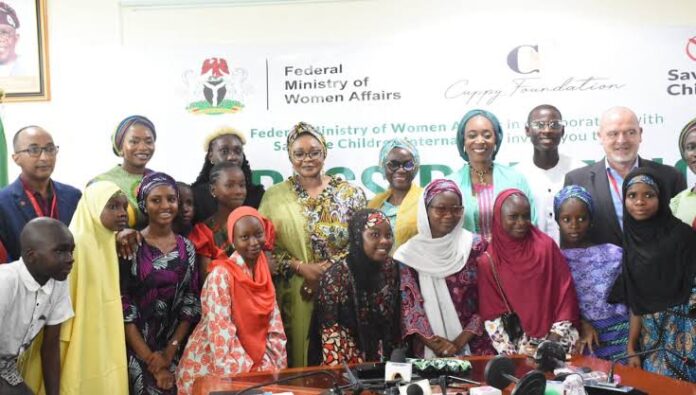As Nigeria prepares to celebrate the 2025 Children’s Day, youths have called for greater inclusion and stronger protection against child trafficking.
The call was made at a news conference organised by the Federal Ministry of Women Affairs in collaboration with Save the Children International, SCI, and other partners Monday in Abuja.
The theme for the 2025 National Children’s Day is “Stand Up, Speak Up: Building a Bullying-Free Generation.”
Speaker of the National Children’s Parliament, Progress Friday-Umoh, highlighted the challenges that children face, including poverty, abuse, exploitation, limited access to education and healthcare, stigma, and social exclusion.
She urged collective action to safeguard their rights and future.
“Children across nations are navigating fear, violence, and exclusion in spaces that should nurture them.
“It is time we give them more than promises, we must provide protection, platforms, and power.
“We need to see the National Policy on Safety, Security, and Violence-Free Schools implemented nationwide, not just on paper, but in practice, in every school, in every state.
“A child cannot learn in fear or in a war zone. Safety in learning environments must be the standard, not the exception.
“We must go beyond signing the Safe School Declaration and start bringing it to life, especially in crisis-prone areas. No child should sit in a classroom wondering if they will make it home,” she said.
Friday-Umoh also emphasised strengthening child rights advocacy clubs, particularly in underserved and rural areas, to raise awareness, spark bold conversations, and nurture young leaders.
She lauded the Girl-Led Movement initiative, supported by Save the Children International, which empowered girls to raise their voices and contribute meaningfully to issues affecting them.
“More initiatives like this should be supported and scaled, including those for boys. We must not only be part of conversations; we must be at the centre of them.
“Let us build a Nigeria where children are safe, free from child labour and trafficking, where every child, regardless of background, has the tools to learn, dream, speak, and rise,” she said.
Safiya Alkali-Ajikolo, member of the Borno State Children’s Parliament, called for increased strategies to protect children in conflict-affected areas, safeguarding their rights to education, health, and basic needs.
Minister of Women Affairs, Hajiya Imaan Sulaiman-Ibrahim, reaffirmed government’s commitment to tackling child trafficking, forced labour, child marriage, domestic abuse, abandonment, and other challenges affecting Nigerian children.
She highlighted recent government efforts including the launch of the National Coastal Action Plan 2025–2030 to end violence against children, as well as the rollout of the National Guidelines on Alternative Care.
“Additionally, the government is reviewing the National Child Policy (2008) and the Child Rights Act (2003) to strengthen child protection frameworks.
“Additional initiatives include developing a National Policy on Menstrual Health and Hygiene Management, establishing the Child Protection Knowledge and Data Center, strengthening child protection services, and reviewing adoption regulations to prevent abuse.
“Government is also launching a universal child grant to alleviate poverty and reduce children’s vulnerability to exploitation, abuse, and malnutrition.
“Furthermore, a National Child Protection Data Grid and a Child Welfare Index will be established to monitor progress and guide policies.
“Most notably, Nigeria will establish a dedicated child protection and development agency, a centralised institutional framework to coordinate all national efforts for children’s welfare, ensuring coherence, efficiency, and long-term impact.”
Mandate Secretary for the FCT Women Affairs Secretariat, Dr Adedayo Benjamins-Laniyi, stressed the importance of creating structures to protect children’s rights and ensure they thrived.
Country Director of Save the Children International, Duncan Harvey, underscored the organisation’s support for implementing the Child Rights Act and strengthening child protection systems to combat bullying in and out of schools.
“It is a legal and moral obligation to protect children from all forms of bullying.
“We call on leaders to invest in anti-bullying policies that create safe, inclusive, and supportive environments where every child can learn, grow, and thrive free from fear, discrimination, or harm.”
He advocated for support of child-led platforms, peer support groups, safe spaces, and school clubs to encourage children to speak up, support one another, and participate in developing school rules and anti-bullying policies.(NAN)





